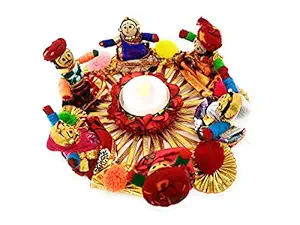॥ ॐ श्री परमात्मने नमः ॥
अथ प्रथमोऽध्यायः । अर्जुनविषादयोगः
धृतराष्ट्र उवाच ।
धर्मक्षेत्रे कुरुक्षेत्रे समवेता युयुत्सवः ।
मामकाः पाण्डवाश्चैव किमकुर्वत सञ्जय ॥ १-१॥
सञ्जय उवाच ।
दृष्ट्वा तु पाण्डवानीकं व्यूढं दुर्योधनस्तदा ।
आचार्यमुपसङ्गम्य राजा वचनमब्रवीत् ॥ १-२॥
पश्यैतां पाण्डुपुत्राणामाचार्य महतीं चमूम् ।
व्यूढां द्रुपदपुत्रेण तव शिष्येण धीमता ॥ १-३॥
अत्र शूरा महेष्वासा भीमार्जुनसमा युधि ।
युयुधानो विराटश्च द्रुपदश्च महारथः ॥ १-४॥
धृष्टकेतुश्चेकितानः काशिराजश्च वीर्यवान् ।
पुरुजित्कुन्तिभोजश्च शैब्यश्च नरपुङ्गवः ॥ १-५॥
युधामन्युश्च विक्रान्त उत्तमौजाश्च वीर्यवान् ।
सौभद्रो द्रौपदेयाश्च सर्व एव महारथाः ॥ १-६॥
अस्माकं तु विशिष्टा ये तान्निबोध द्विजोत्तम ।
नायका मम सैन्यस्य संज्ञार्थं तान्ब्रवीमि ते ॥ १-७॥
भवान्भीष्मश्च कर्णश्च कृपश्च समितिञ्जयः ।
अश्वत्थामा विकर्णश्च सौमदत्तिस्तथैव च ॥ १-८॥ (सौमदत्तिर्जयद्रथः)
अन्ये च बहवः शूरा मदर्थे त्यक्तजीविताः ।
नानाशस्त्रप्रहरणाः सर्वे युद्धविशारदाः ॥ १-९॥
अपर्याप्तं तदस्माकं बलं भीष्माभिरक्षितम् ।
पर्याप्तं त्विदमेतेषां बलं भीमाभिरक्षितम् ॥ १-१०॥
अयनेषु च सर्वेषु यथाभागमवस्थिताः ।
भीष्ममेवाभिरक्षन्तु भवन्तः सर्व एव हि ॥ १-११॥
तस्य सञ्जनयन्हर्षं कुरुवृद्धः पितामहः ।
सिंहनादं विनद्योच्चैः शङ्खं दध्मौ प्रतापवान् ॥ १-१२॥
ततः शङ्खाश्च भेर्यश्च पणवानकगोमुखाः ।
सहसैवाभ्यहन्यन्त स शब्दस्तुमुलोऽभवत् ॥ १-१३॥
ततः श्वेतैर्हयैर्युक्ते महति स्यन्दने स्थितौ ।
माधवः पाण्डवश्चैव दिव्यौ शङ्खौ प्रदध्मतुः ॥ १-१४॥
पाञ्चजन्यं हृषीकेशो देवदत्तं धनञ्जयः ।
पौण्ड्रं दध्मौ महाशङ्खं भीमकर्मा वृकोदरः ॥ १-१५॥
अनन्तविजयं राजा कुन्तीपुत्रो युधिष्ठिरः ।
नकुलः सहदेवश्च सुघोषमणिपुष्पकौ ॥ १-१६॥
काश्यश्च परमेष्वासः शिखण्डी च महारथः ।
धृष्टद्युम्नो विराटश्च सात्यकिश्चापराजितः ॥ १-१७॥
द्रुपदो द्रौपदेयाश्च सर्वशः पृथिवीपते ।
सौभद्रश्च महाबाहुः शङ्खान्दध्मुः पृथक्पृथक् ॥ १-१८॥
स घोषो धार्तराष्ट्राणां हृदयानि व्यदारयत् ।
नभश्च पृथिवीं चैव तुमुलोऽभ्यनुनादयन् ॥ १-१९॥ (तुमुलो व्यनुनादयन्)
अथ व्यवस्थितान्दृष्ट्वा धार्तराष्ट्रान् कपिध्वजः ।
प्रवृत्ते शस्त्रसम्पाते धनुरुद्यम्य पाण्डवः ॥ १-२०॥
हृषीकेशं तदा वाक्यमिदमाह महीपते ।
अर्जुन उवाच ।
सेनयोरुभयोर्मध्ये रथं स्थापय मेऽच्युत ॥ १-२१॥
यावदेतान्निरीक्षेऽहं योद्धुकामानवस्थितान् ।
कैर्मया सह योद्धव्यमस्मिन् रणसमुद्यमे ॥ १-२२॥
योत्स्यमानानवेक्षेऽहं य एतेऽत्र समागताः ।
धार्तराष्ट्रस्य दुर्बुद्धेर्युद्धे प्रियचिकीर्षवः ॥ १-२३॥
सञ्जय उवाच ।
एवमुक्तो हृषीकेशो गुडाकेशेन भारत ।
सेनयोरुभयोर्मध्ये स्थापयित्वा रथोत्तमम् ॥ १-२४॥
भीष्मद्रोणप्रमुखतः सर्वेषां च महीक्षिताम् ।
उवाच पार्थ पश्यैतान्समवेतान्कुरूनिति ॥ १-२५॥
तत्रापश्यत्स्थितान्पार्थः पितॄनथ पितामहान् ।
आचार्यान्मातुलान्भ्रातॄन्पुत्रान्पौत्रान्सखींस्तथा ॥ १-२६॥
श्वशुरान्सुहृदश्चैव सेनयोरुभयोरपि ।
तान्समीक्ष्य स कौन्तेयः सर्वान्बन्धूनवस्थितान् ॥ १-२७॥
कृपया परयाविष्टो विषीदन्निदमब्रवीत् ।
अर्जुन उवाच ।
दृष्ट्वेमं स्वजनं कृष्ण युयुत्सुं समुपस्थितम् ॥ १-२८॥
सीदन्ति मम गात्राणि मुखं च परिशुष्यति ।
वेपथुश्च शरीरे मे रोमहर्षश्च जायते ॥ १-२९॥
गाण्डीवं स्रंसते हस्तात्त्वक्चैव परिदह्यते ।
न च शक्नोम्यवस्थातुं भ्रमतीव च मे मनः ॥ १-३०॥
निमित्तानि च पश्यामि विपरीतानि केशव ।
न च श्रेयोऽनुपश्यामि हत्वा स्वजनमाहवे ॥ १-३१॥
न काङ्क्षे विजयं कृष्ण न च राज्यं सुखानि च ।
किं नो राज्येन गोविन्द किं भोगैर्जीवितेन वा ॥ १-३२॥
येषामर्थे काङ्क्षितं नो राज्यं भोगाः सुखानि च ।
त इमेऽवस्थिता युद्धे प्राणांस्त्यक्त्वा धनानि च ॥ १-३३॥
आचार्याः पितरः पुत्रास्तथैव च पितामहाः ।
मातुलाः श्वशुराः पौत्राः श्यालाः सम्बन्धिनस्तथा ॥ १-३४॥
एतान्न हन्तुमिच्छामि घ्नतोऽपि मधुसूदन ।
अपि त्रैलोक्यराज्यस्य हेतोः किं नु महीकृते ॥ १-३५॥
निहत्य धार्तराष्ट्रान्नः का प्रीतिः स्याज्जनार्दन ।
पापमेवाश्रयेदस्मान्हत्वैतानाततायिनः ॥ १-३६॥
तस्मान्नार्हा वयं हन्तुं धार्तराष्ट्रान्स्वबान्धवान् ।
स्वजनं हि कथं हत्वा सुखिनः स्याम माधव ॥ १-३७॥
यद्यप्येते न पश्यन्ति लोभोपहतचेतसः ।
कुलक्षयकृतं दोषं मित्रद्रोहे च पातकम् ॥ १-३८॥
कथं न ज्ञेयमस्माभिः पापादस्मान्निवर्तितुम् ।
कुलक्षयकृतं दोषं प्रपश्यद्भिर्जनार्दन ॥ १-३९॥
कुलक्षये प्रणश्यन्ति कुलधर्माः सनातनाः ।
धर्मे नष्टे कुलं कृत्स्नमधर्मोऽभिभवत्युत ॥ १-४०॥
अधर्माभिभवात्कृष्ण प्रदुष्यन्ति कुलस्त्रियः ।
स्त्रीषु दुष्टासु वार्ष्णेय जायते वर्णसङ्करः ॥ १-४१॥
सङ्करो नरकायैव कुलघ्नानां कुलस्य च ।
पतन्ति पितरो ह्येषां लुप्तपिण्डोदकक्रियाः ॥ १-४२॥
दोषैरेतैः कुलघ्नानां वर्णसङ्करकारकैः ।
उत्साद्यन्ते जातिधर्माः कुलधर्माश्च शाश्वताः ॥ १-४३॥
उत्सन्नकुलधर्माणां मनुष्याणां जनार्दन ।
नरके नियतं वासो भवतीत्यनुशुश्रुम ॥ १-४४॥ (नरकेऽनियतं)
अहो बत महत्पापं कर्तुं व्यवसिता वयम् ।
यद्राज्यसुखलोभेन हन्तुं स्वजनमुद्यताः ॥ १-४५॥
यदि मामप्रतीकारमशस्त्रं शस्त्रपाणयः ।
धार्तराष्ट्रा रणे हन्युस्तन्मे क्षेमतरं भवेत् ॥ १-४६॥
सञ्जय उवाच ।
एवमुक्त्वार्जुनः सङ्ख्ये रथोपस्थ उपाविशत् ।
विसृज्य सशरं चापं शोकसंविग्नमानसः ॥ १-४७॥
ॐ तत्सदिति श्रीमद्भगवद्गीतासूपनिषत्सु
ब्रह्मविद्यायां योगशास्त्रे श्रीकृष्णार्जुनसंवादे
अर्जुनविषादयोगो नाम प्रथमोऽध्यायः ॥ १॥
Introduction to Chapter 1
Overview of Arjuna Vishada Yoga
Chapter 1 of the Bhagavad Gita is known as 'Arjuna Vishada Yoga' or 'The Yoga of Arjuna's Dejection.' It sets the stage for the spiritual discourse by depicting Arjuna's moral and emotional crisis on the battlefield.
Setting the Scene
The chapter begins with King Dhritarashtra inquiring about the events on the battlefield of Kurukshetra. His charioteer, Sanjaya, narrates the unfolding events, describing the preparations for war and the emotions of the warriors.
Arjuna's Dilemma
As the battle preparations commence, Arjuna, the great warrior, is filled with sorrow and compassion upon seeing his relatives, teachers, and friends on both sides. He is torn between his duty as a warrior and his love for his kin.
The Role of Krishna
Lord Krishna, Arjuna's charioteer, remains a silent observer during Arjuna's turmoil. His calm presence sets the stage for the profound teachings that will follow in the subsequent chapters.
Significance of the Chapter
This chapter is crucial as it introduces the central conflict and sets the context for the philosophical dialogue between Arjuna and Krishna, addressing the complexities of duty, righteousness, and human emotions.
Arjuna's Emotional Turmoil
Arjuna's Physical Symptoms
Arjuna experiences physical manifestations of his inner turmoil, including trembling limbs, a dry mouth, and a heavy heart, indicating the depth of his emotional crisis.
Verbal Expressions of Sorrow
He articulates his feelings of helplessness and confusion, stating that he cannot fight and that his body and mind are overwhelmed by grief.
Desire to Flee the Battlefield
Arjuna contemplates abandoning the battlefield, expressing a desire to renounce his weapons and escape from the impending conflict.
Rejection of Material Gains
He declares that he does not desire victory, kingdom, or pleasures if they come at the cost of killing his relatives.
Seeking Guidance
In his despair, Arjuna turns to Krishna, seeking counsel and expressing his inability to make a decision on his own.
Krishna's Observations
Krishna's Silence
Lord Krishna listens attentively to Arjuna's lamentations without interruption, allowing Arjuna to express his emotions fully.
Understanding Arjuna's Conflict
Krishna perceives the depth of Arjuna's moral dilemma and prepares to impart spiritual wisdom to resolve his confusion.
Role as a Guide
Krishna assumes the role of a spiritual guide, ready to lead Arjuna through his crisis towards clarity and understanding.
Significance of His Presence
Krishna's presence on the battlefield symbolizes divine guidance amidst human struggles, highlighting the importance of seeking higher wisdom in times of distress.
Preparation for Teaching
The chapter concludes with Arjuna's plea for guidance, setting the stage for Krishna's teachings in the subsequent chapters.
Philosophical Themes
Dharma and Righteousness
The chapter introduces the concept of 'dharma' or righteous duty, as Arjuna grapples with his responsibilities as a warrior and his moral values.
Attachment and Detachment
Arjuna's attachment to his family and his desire to avoid conflict highlight the tension between personal attachments and the need for detachment in fulfilling one's duties.
Emotional Intelligence
Arjuna's emotional responses underscore the importance of emotional intelligence and self-awareness in making ethical decisions.
The Role of the Divine
Krishna's role as Arjuna's charioteer symbolizes the guidance of the divine in navigating life's challenges and moral dilemmas.
The Path to Wisdom
The chapter sets the foundation for the journey towards spiritual wisdom, emphasizing the need for introspection and seeking guidance in times of confusion.
Conclusion
Summary of Chapter 1
Chapter 1 of the Bhagavad Gita presents Arjuna's moral and emotional crisis on the battlefield, setting the stage for the spiritual teachings that follow.
Importance in the Gita
This chapter is significant as it introduces the central conflict and themes that are explored in depth throughout the Bhagavad Gita.
Relevance to Modern Life
The dilemmas faced by Arjuna resonate with contemporary issues, offering timeless lessons on duty, morality, and the human condition.
Preparation for Krishna's Teachings
The chapter concludes with Arjuna seeking guidance from Krishna, paving the way for the profound spiritual teachings in the subsequent chapters.
Invitation to Explore
Readers are encouraged to delve deeper into the Bhagavad Gita to gain insights into the philosophical and spiritual wisdom it offers.
Chapter 1 of the Bhagavad Gita is known as 'Arjuna Vishada Yoga' or 'The Yoga of Arjuna's Dejection.' It sets the stage for the spiritual discourse by depicting Arjuna's moral and emotional crisis on the battlefield.
The chapter begins with King Dhritarashtra inquiring about the events on the battlefield of Kurukshetra. His charioteer, Sanjaya, narrates the unfolding events, describing the preparations for war and the emotions of the warriors.
As the battle preparations commence, Arjuna, the great warrior, is filled with sorrow and compassion upon seeing his relatives, teachers, and friends on both sides. He is torn between his duty as a warrior and his love for his kin.
Lord Krishna, Arjuna's charioteer, remains a silent observer during Arjuna's turmoil. His calm presence sets the stage for the profound teachings that will follow in the subsequent chapters.
This chapter is crucial as it introduces the central conflict and sets the context for the philosophical dialogue between Arjuna and Krishna, addressing the complexities of duty, righteousness, and human emotions.
Arjuna experiences physical manifestations of his inner turmoil, including trembling limbs, a dry mouth, and a heavy heart, indicating the depth of his emotional crisis.
He articulates his feelings of helplessness and confusion, stating that he cannot fight and that his body and mind are overwhelmed by grief.
Arjuna contemplates abandoning the battlefield, expressing a desire to renounce his weapons and escape from the impending conflict.
He declares that he does not desire victory, kingdom, or pleasures if they come at the cost of killing his relatives.
In his despair, Arjuna turns to Krishna, seeking counsel and expressing his inability to make a decision on his own.
Lord Krishna listens attentively to Arjuna's lamentations without interruption, allowing Arjuna to express his emotions fully.
Krishna perceives the depth of Arjuna's moral dilemma and prepares to impart spiritual wisdom to resolve his confusion.
Krishna assumes the role of a spiritual guide, ready to lead Arjuna through his crisis towards clarity and understanding.
Krishna's presence on the battlefield symbolizes divine guidance amidst human struggles, highlighting the importance of seeking higher wisdom in times of distress.
The chapter concludes with Arjuna's plea for guidance, setting the stage for Krishna's teachings in the subsequent chapters.
The chapter introduces the concept of 'dharma' or righteous duty, as Arjuna grapples with his responsibilities as a warrior and his moral values.
Arjuna's attachment to his family and his desire to avoid conflict highlight the tension between personal attachments and the need for detachment in fulfilling one's duties.
Arjuna's emotional responses underscore the importance of emotional intelligence and self-awareness in making ethical decisions.
Krishna's role as Arjuna's charioteer symbolizes the guidance of the divine in navigating life's challenges and moral dilemmas.
The chapter sets the foundation for the journey towards spiritual wisdom, emphasizing the need for introspection and seeking guidance in times of confusion.
Chapter 1 of the Bhagavad Gita presents Arjuna's moral and emotional crisis on the battlefield, setting the stage for the spiritual teachings that follow.
This chapter is significant as it introduces the central conflict and themes that are explored in depth throughout the Bhagavad Gita.
The dilemmas faced by Arjuna resonate with contemporary issues, offering timeless lessons on duty, morality, and the human condition.
The chapter concludes with Arjuna seeking guidance from Krishna, paving the way for the profound spiritual teachings in the subsequent chapters.
Readers are encouraged to delve deeper into the Bhagavad Gita to gain insights into the philosophical and spiritual wisdom it offers.


